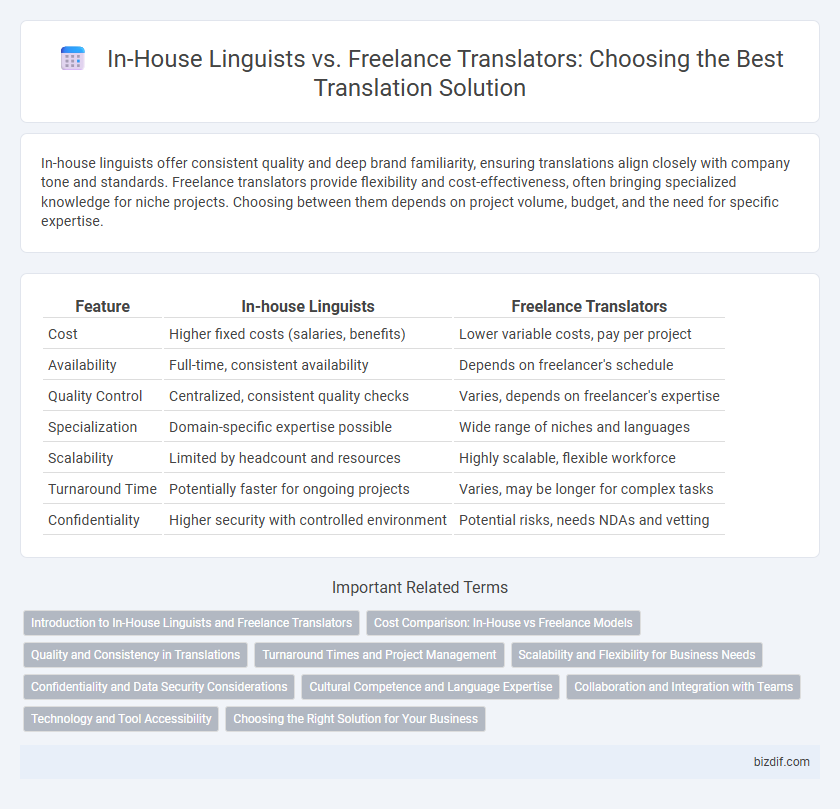In-house linguists offer consistent quality and deep brand familiarity, ensuring translations align closely with company tone and standards. Freelance translators provide flexibility and cost-effectiveness, often bringing specialized knowledge for niche projects. Choosing between them depends on project volume, budget, and the need for specific expertise.
Table of Comparison
| Feature | In-house Linguists | Freelance Translators |
|---|---|---|
| Cost | Higher fixed costs (salaries, benefits) | Lower variable costs, pay per project |
| Availability | Full-time, consistent availability | Depends on freelancer's schedule |
| Quality Control | Centralized, consistent quality checks | Varies, depends on freelancer's expertise |
| Specialization | Domain-specific expertise possible | Wide range of niches and languages |
| Scalability | Limited by headcount and resources | Highly scalable, flexible workforce |
| Turnaround Time | Potentially faster for ongoing projects | Varies, may be longer for complex tasks |
| Confidentiality | Higher security with controlled environment | Potential risks, needs NDAs and vetting |
Introduction to In-House Linguists and Freelance Translators
In-house linguists are dedicated language professionals employed full-time within an organization, ensuring consistent quality and branded communication across all translation projects. Freelance translators operate independently, offering flexible, project-based expertise tailored to diverse industries and linguistic needs. Both play pivotal roles in localization strategies, balancing control and adaptability in global communication efforts.
Cost Comparison: In-House vs Freelance Models
In-house linguists entail fixed costs such as salaries, benefits, and office expenses, leading to higher overhead compared to freelance translators, who offer flexible, project-based pricing without long-term commitments. Freelance translators can reduce expenses by eliminating costs related to recruitment, training, and employee management, making them a cost-effective solution for variable translation demands. However, for consistent, high-volume projects, in-house teams may provide better cost predictability and integration with company workflows.
Quality and Consistency in Translations
In-house linguists ensure higher quality and consistency in translations through standardized processes and ongoing collaboration within the same team, fostering a unified brand voice. Freelance translators may offer specialized expertise and flexibility but can introduce variability in style and terminology without stringent project management. Investing in rigorous quality control and clear communication protocols is crucial to maintain translation accuracy across freelance contributions.
Turnaround Times and Project Management
In-house linguists typically offer faster turnaround times due to immediate availability and integrated access to company resources. Freelance translators provide flexible scalability but may require longer project management coordination, impacting delivery speed. Efficient project management tools enhance oversight and streamline communication across both in-house and freelance translation teams.
Scalability and Flexibility for Business Needs
In-house linguists offer consistent quality and deep domain expertise but may lack the scalability to handle fluctuating translation volumes quickly. Freelance translators provide greater flexibility and rapid scalability, adapting to varying project sizes and tight deadlines with diverse language skills. Combining both options allows businesses to optimize translation workflows, balancing cost efficiency with adaptable resource allocation for dynamic market demands.
Confidentiality and Data Security Considerations
In-house linguists offer enhanced confidentiality and data security by working within a controlled company environment with direct oversight and secure IT infrastructure. Freelance translators may pose higher risks due to variable security practices and reliance on personal devices, which can increase vulnerability to data breaches. Implementing strict confidentiality agreements and using encrypted communication tools is essential to protect sensitive information regardless of the translator type.
Cultural Competence and Language Expertise
In-house linguists offer consistent cultural competence and deep language expertise tailored to company-specific projects, ensuring alignment with brand voice and regional nuances. Freelance translators bring diverse cultural insights and specialized knowledge across multiple industries, providing flexibility and access to niche language expertise. Choosing between the two depends on whether the priority lies in sustained cultural integration or versatile, project-based language skills.
Collaboration and Integration with Teams
In-house linguists offer seamless collaboration and integration within corporate teams, enabling real-time communication, consistent terminology use, and immediate feedback loops that enhance project coherence. Freelance translators provide flexible expertise but may face challenges in aligning with internal workflows and accessing proprietary resources, potentially slowing team synchronization. Effective collaboration tools and clear communication protocols are essential for integrating freelancers smoothly into team environments, ensuring consistent translation quality and timely delivery.
Technology and Tool Accessibility
In-house linguists typically benefit from seamless access to proprietary translation management systems and advanced CAT tools, ensuring consistency and integration with company workflows. Freelance translators often rely on cloud-based platforms and personal subscriptions to industry-standard software, enabling flexibility but sometimes limiting tool compatibility. Both setups require investing in technology to optimize efficiency, though in-house teams generally enjoy more direct IT support and streamlined tool updates.
Choosing the Right Solution for Your Business
Selecting between in-house linguists and freelance translators depends on factors like project volume, language specialization, and budget constraints. In-house linguists offer consistent quality and better collaboration for ongoing translation needs, while freelance translators provide flexibility and cost-efficiency for varied or seasonal workloads. Businesses should evaluate their translation demand, confidentiality requirements, and turnaround times to determine the optimal solution that ensures accurate and efficient multilingual communication.
In-house Linguists vs Freelance Translators Infographic

 bizdif.com
bizdif.com